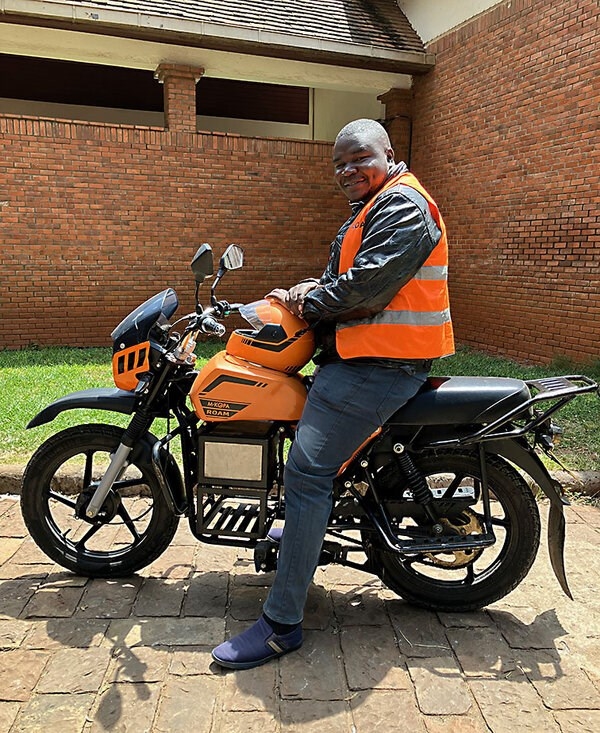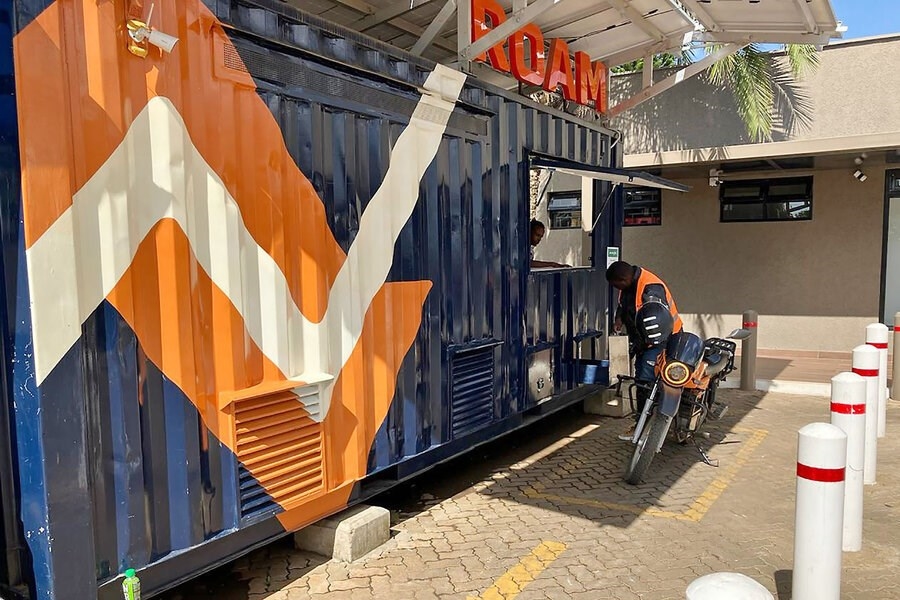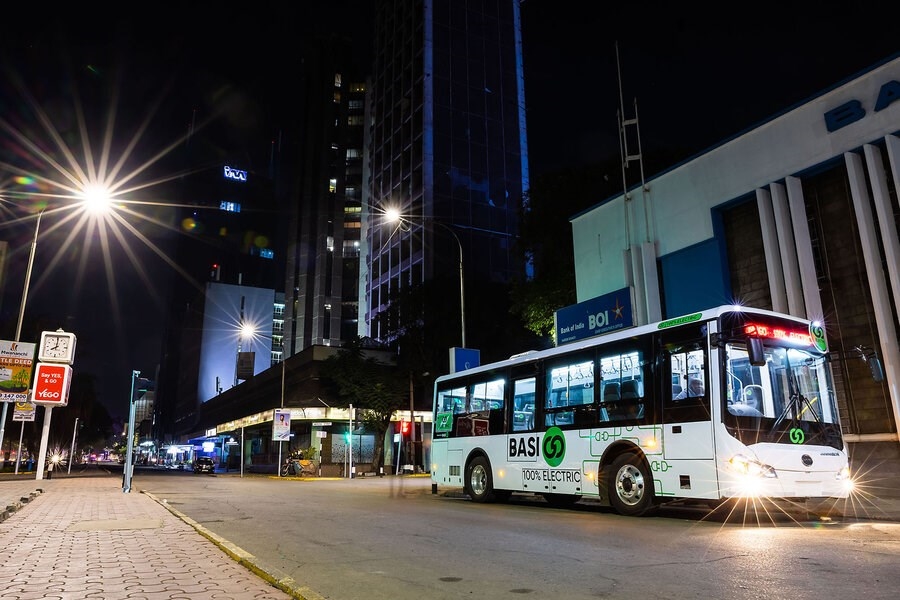REPRINTED WITH PERMISSION FROM THE CHRISTIAN SCIENCE MONITOR
When it comes to cars, the world is going electric. Innovators in Africa want to make sure the continent is not left behind.
 Brian Otunga, a motorbike taxi driver, chats with colleagues. They complain of rising fuel prices; Mr. Otunga drives an electric bike.Lenny Rashid Ruvaga
Brian Otunga, a motorbike taxi driver, chats with colleagues. They complain of rising fuel prices; Mr. Otunga drives an electric bike.Lenny Rashid Ruvaga
| NAIROBI, KENYA - On a recent morning, a group of delivery drivers slouched against their motorbikes near a petrol station here and launched into an animated discussion.
“Petrol prices keep increasing; it’s unbearable,” one man complained.
“I’m barely breaking even,” another lamented.
Nearby, Brian Otunga listened silently from atop his orange-and-black bike. Two years ago, he would have been front and center in this gripe session. But now he drives an electric motorbike, and gas prices feel like a worry from another lifetime. A price hike “does not bother me at all,” he says.
Mr. Otunga and his Halloween-hued motorcycle are part of a global paradigm shift. A decade from now, electric vehicles will probably be the only choice in the world’s biggest car markets: China, the United States, and the European Union. And by 2050, EVs are likely to make up more than three-quarters of all vehicle sales around the world, part of a bid to slash vehicle emissions and slow climate change.
The stakes of this transition are particularly high in sub-Saharan Africa, a region on the front lines of global warming, where air pollution levels are also among the worst in the world. However, going electric also poses a unique set of challenges on a continent where only about half of the population is on the electricity grid and the price difference between a combustion engine car and an EV can amount to a year’s wages.
For the continent to quietly glide into an electric future with the rest of the world, “the infrastructure [must] be made easily accessible and more affordable,” says Céleste Vogel, co-founder of eWAKA, a company that sells electric motorbikes and cargo bicycles in Kenya and Rwanda. Otherwise, she says, Africa runs the risk of being left behind altogether.
Mr. Otunga never set out to be a clean energy pioneer, or even to drive a motorcycle for a living at all. He studied as a chef, and dreamed of opening his own gourmet restaurant. But cooking jobs were hard to come by, and eventually he realized he could make more money driving a boda boda, one of the ubiquitous motorbikes that Kenyans rely on as both taxis and delivery vehicles.
 Lenny Rashid RuvagaBrian Otunga sits on his electric motorbike taxi in Nairobi, taking a break between customers.
Lenny Rashid RuvagaBrian Otunga sits on his electric motorbike taxi in Nairobi, taking a break between customers.
The work was steady, he says, but it also came with a slew of challenges. The pungent black smoke from his exhaust pipe gave him headaches. Neighbors complained that the roar of his bike starting up was waking them up in the morning. And gas prices just kept going up and up.
Then, a little over three years ago, a salesperson from a Swedish Kenyan company called Roam wheeled an orange-and-black bike into Mr. Otunga’s boda boda “bay,” the corner of a local parking lot where he and other drivers sit, awaiting jobs.
Mr. Otunga was taken. At the time, “[my] headaches were quite unbearable,” he remembers. Then he heard the price.
At about $2000, the Roam electric bike was twice the price of one with a normal combustion engine. Mr. Otunga’s heart sank.
That’s a problem mirrored across Africa, where EV costs are often prohibitive, Ms. Vogel says.
The gap between EVs and their combustion engine cousins is the most pronounced when it comes to cars. When Mr. Otunga pulled out of the boda boda bay where his colleagues were complaining about petrol prices, he merged onto a road filled with old European and Asian sedans that coughed black smoke into his face. They are “in dire need of service,” he quipped.
Because of high demand and loose import restrictions, sub-Saharan Africa has become a kind of graveyard for the world’s old cars, with 40% of worldwide used vehicle exports ending up on the continent.
 Lenny Rashid RuvagaBrian Otunga swaps his empty battery for a recharge.
Lenny Rashid RuvagaBrian Otunga swaps his empty battery for a recharge.
This compounds the problems for EV adoption in Africa, experts say, because the used vehicles crowd nearly all electric cars out of the market. But governments are pushing back. Last year, Kenya banned the import of used cars more than 8 years old, and Rwanda has eliminated import taxes on electric vehicles. Still, EV companies in the region say they struggle to compete with secondhand cars.
That’s why most of the 20-odd EV startups in the East Africa region focus on types of electric vehicles that aren’t cars. Many are particularly geared toward motorcycles.
For Mr. Otunga, the idea of driving a vehicle he never had to fill up with gas again was enough to convince him that the higher price of an electric bike was worth it. For a year and a half, he scrimped and saved, and then in mid-2022, he bought his orange-and-black bike.
Soon, his headaches cleared up. He now says he makes more money, too – averaging about $16 a day now, compared with about $12 a day on his old bike. He also works less, about 13 hours a day, compared with as many as 17 before.
 Courtesy of BasiGoAn electric bus awaits passengers in Nairobi. Known for their colorful minibus culture, Kenyans are turning to low-carbon transport.
Courtesy of BasiGoAn electric bus awaits passengers in Nairobi. Known for their colorful minibus culture, Kenyans are turning to low-carbon transport.
Often, Mr. Otunga finds himself on the road beside matatus, the extravagantly painted minibuses that serve as another crucial mode of public transit here. In recent years, buses have been another target of EV startups in this region, because their regular routes mean it’s easy to predict their charging needs.
That’s important because charging is another barrier to EV access in many countries in Africa, which has the lowest rates of electricity access in the world.
Although Kenya is better off than most, with a 75% electrification rate, EV companies here said they’ve still had to get creative. For instance, BasiGo, a Kenyan startup, set up four charging stations in Nairobi for its electric matatus to use. “One of the biggest challenges is that it takes time and resources to build infrastructure,” says Samuel Kamunya, BasiGo’s head of business development.
The day his colleagues were lamenting petrol prices, Mr. Otunga spent about six hours on the road before he saw his own digital “fuel” gauge flashing. He pulled over and swapped the battery in his bike for the spare stored behind his front wheels. Then, he took off for the 3-kilometer drive to the nearest Roam charging station.
There, he paid about $1 to swap out the dead battery for a new one – about 20% of what he says he used to spend on gas.
As Mr. Otunga pulled out, his phone chimed, alerting him to a request from an app to deliver a parcel. Driving to collect it, he passed several petrol stations along the road. But he barely even noticed they were there.
Page created on 4/8/2024 10:21:20 AM
Last edited 4/8/2024 10:55:19 AM
